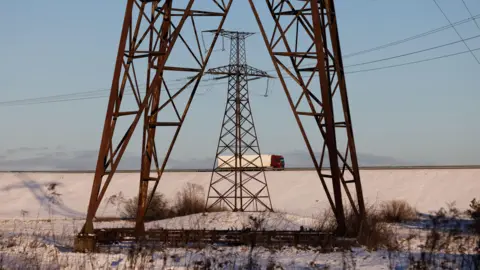[ad_1]
 Getty Images
Getty Images
More than three a long time after leaving the Soviet Union, Estonia, Latvia, and Lithuania are getting ready to unplug from Russia’s electrical energy grid and be a part of the EU’s community.
The two-day course of will start on Saturday, with residents instructed to cost their units, refill on meals and water, and put together as if extreme climate is forecast.
Many have been instructed to not use lifts – whereas in some areas visitors lights will probably be turned off.
An enormous, specially-made clock, will rely down the ultimate seconds earlier than the transition at a landmark ceremony in Lithuania’s capital on Sunday, attended by EU chief Ursula von der Leyen.
The three nations will then formally transition away from the so-called Brell energy grid, which has related them to Russia and Belarus because the finish of World War Two.
The Brell grid – which stands for Belarus, Russia, Estonia, Latvia, Lithuania – is managed nearly solely by Russia and has lengthy been seen as a vulnerability for the previous Soviet republics, which are actually Nato members.
After disconnecting from it, the three nations will function in “isolated mode” for about 24 hours – surviving solely on their very own energy – earlier than integrating into the European grid by way of Poland.
On Saturday morning, Lithuania stated it had disconnected from Russia’s grid, with Latvia and Estonia anticipated to comply with shortly.
“We are now removing Russia’s ability to use the electricity system as a tool of geopolitical blackmail,” Lithuania’s Energy Minister Zygimantas Vaiciunas instructed AFP information company.
“It’s the culmination of efforts over more than 10 years or 20 years, to reduce that energy dependence,” Prof David Smith of the Baltic Research Unit on the University of Glasgow instructed the BBC.
“When the Baltic States joined the EU and Nato, everybody talked about them being an energy island that was still dependent on that joint electricity network with Belarus and Russia,” stated Smith. “That’s been completely broken now.”
Tensions between the Baltic States and Russia, which share a mixed 543 mile-long (874km) border, have soared since Russia’s full-scale invasion of Ukraine in February 2022.
Since then, a spate of suspected sabotage incidents involving electrical energy cables and pipelines within the Baltic Sea have prompted fears that Moscow might retaliate towards the shift in direction of EU power.
In the previous 18 months, a minimum of 11 cables working below the Baltic Sea have been broken. In a current case, a ship from Russia’s “shadow fleet” of oil tankers was accused of damaging Estonia’s fundamental energy hyperlink within the Gulf of Finland. The Kremlin declined to remark.
Nato has not accused Russia, however has responded by launching a brand new patrol mission of the area named Baltic Sentry.
“We cannot rule out some kind of provocation. That is why Latvian and foreign security authorities are on high alert,” Latvian President Edgars RinkÄ“viĨs stated on Wednesday.
“Clearly there are risks, we understand that very well,” Latvian Prime Minister Evika Silina echoed. “But the risks are identified and there is a contingency plan.”
In current months, frequent emergency operation exams have been carried out to assist put together for potential focused assaults on the power system, a spokesperson from the Nato Energy Security Centre of Excellence instructed BBC News.
The head of Estonia’s Cybersecurity Centre, Gert Auvaart, instructed BBC News in an announcement that Russia “may attempt to exploit this period to create uncertainty”, however stated that attributable to worldwide co-operation, Estonia was “well-prepared even for worst-case scenarios”.
He added that cyber-attacks towards the nation had surged following Russia’s invasion of Ukraine, and ranged from “hacktivist-driven DDoS attacks [Distributed Denial-Of-Service] to more sophisticated, targeted operations against government agencies and businesses”.
The Baltic states may also be on look ahead to misinformation campaigns associated to the transition.
Shortly after they notified Russia of their choice to withdraw from Brell in August 2024, disinformation campaigns emerged on social media falsely warning of provide failures and hovering costs if the nations had been to go away the joint energy grid.
[ad_2]


